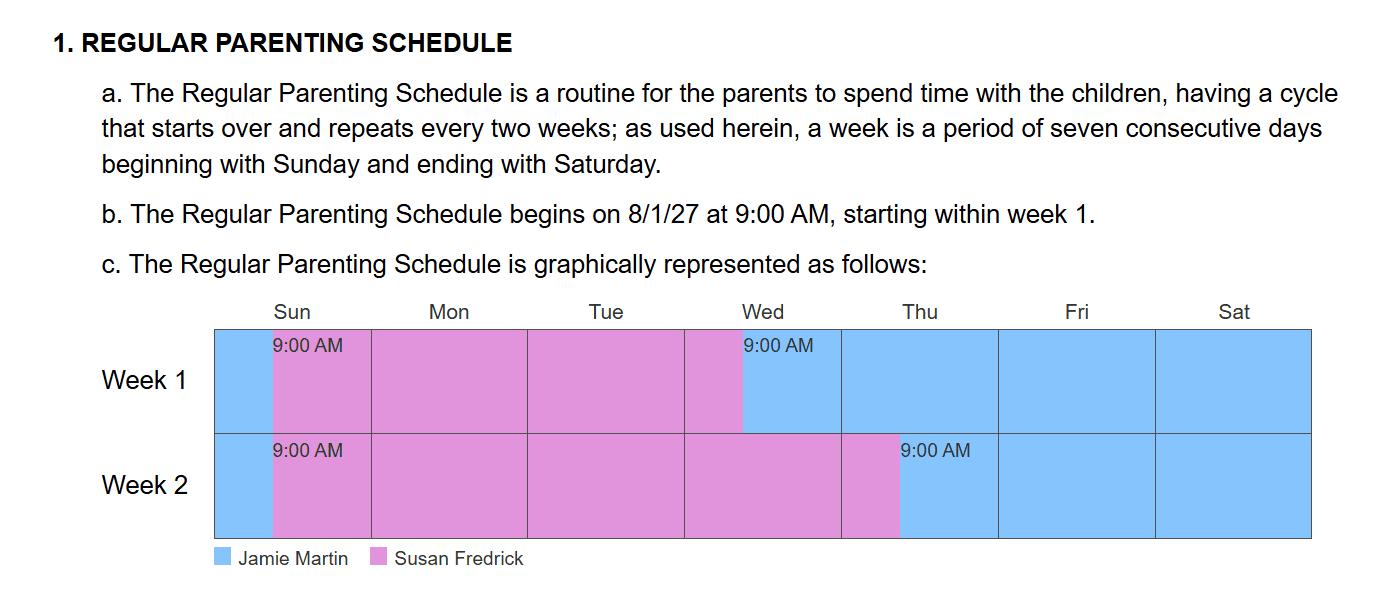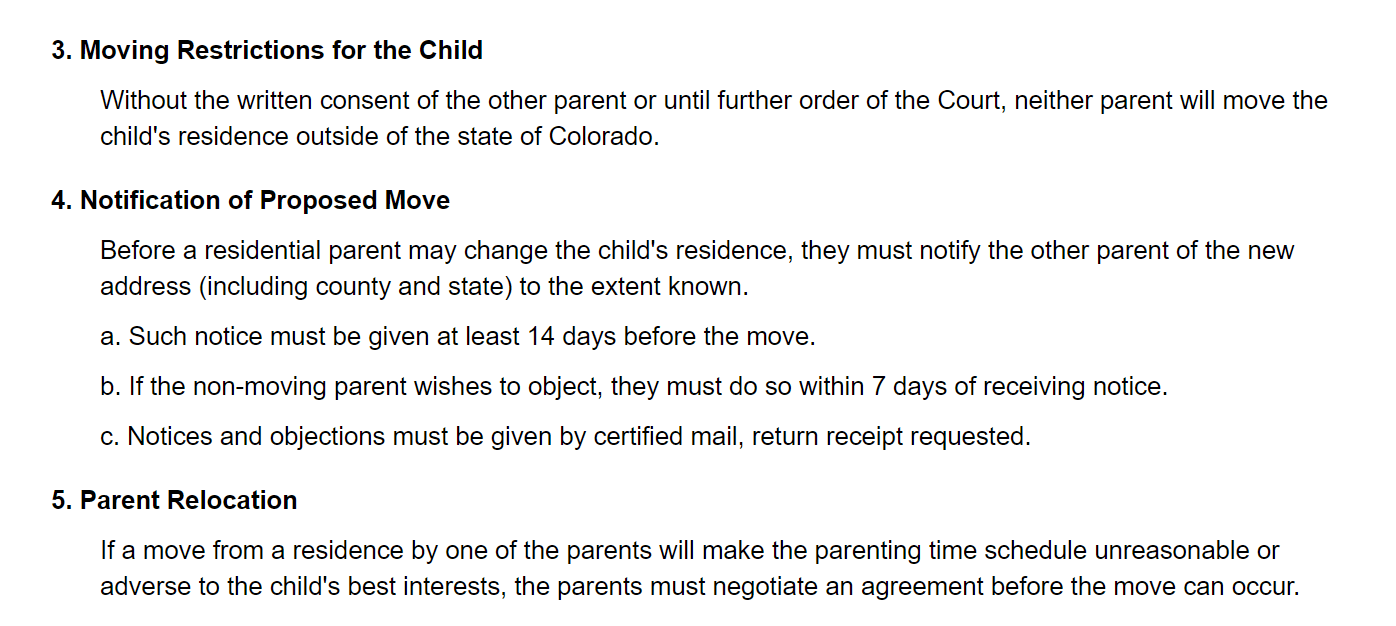Parenting Plan Checklist for Mediation & Co-parenting
A parenting plan is an essential part of co-parenting that lays out how parents will raise their child. You'll need a parenting plan for negotiations with the other parent, for mediation and for court. The best parenting plans are very detailed to account for every potential point of contention.
A parenting plan checklist helps you account for required provisions (like the type of custody) as well as optional ones. You can ignore suggestions that don't apply to your situation. The court ultimately decides the final terms of your parenting plan, which must be in the best interest of the child. Your proposals guide the court on what terms to include.
1. Choose a parenting schedule
 Try this with Custody X Change.
Try this with Custody X Change.
- Which co-parenting arrangement do you think best suits your situation: equal shared parenting, parallel parenting, birdnest parenting?
- Which type of schedule will you choose: 50/50, 60/40, 70/30, 80/20, or 90/10?
- Will you have specific schedules for each holiday?
- What about vacation schedules?
2. Decide who's allowed to make decisions for the child
- Will parents have joint legal custody or will one parent have sole legal custody?
- Will there be any exceptions? For example, you may have joint legal custody but only want one parent to make educational decisions.
3. Cover requirements when a parent moves

- Will you place limits on where parents can move?
- Must both parents ask for permission to move out of that area or just the custodial parent?
- How much advance notice must parents give?
4. Figure out how exchanging the child will work

- Will exchanges happen in a public place?
- Are parents allowed to drop the child off at the front door?
- Are supervised exchanges needed?
- How will parents transport the child to and from visits?
- If you have a long-distance parenting situation, will the child travel by plane, train, bus, etc.? Must they have an escort? Who will cover the associated costs?
5. Plan for unexpected schedule changes
- What happens when a parent is late for a visit?
- What happens when a parent misses a visit? Will you allow makeup time?
6. Include details about communication
- What are the acceptable ways parents can contact one another? (e.g., "Parents can only talk through a parenting app.")
- How can parents stay in touch with the child during the other parent's visits?
- Between what hours is communication allowed?
- Must parents tell one another where the child is during visits?
7. Cover the child's medical needs

- Will the child receive vaccines that aren't legally required?
- How soon after a child sees a doctor must parents tell one another?
- Should both parents have access to the child's medical records?
8. Detail education arrangements
- Who can drop the child off at and pick them up from school?
- Who attends parent-teacher conferences?
- Under what circumstances is the child allowed to be absent from school?
- Does the child need tutoring?
9. State rules for the involvement of third parties

- Are grandparents or aunts or uncles allowed to have regular visits with the child?
- Is there anyone you don't want the child to have contact with?
- If the child has half-siblings, how will you support those relationships?
- How will you handle a parent's new partner? Must the other parent meet the partner before the child does? Can the partner stay overnight when the child is present?
10. Specify your child care arrangements
- How will you choose a child care provider?
- Who's responsible for taking the child to and from day care?
- If a parent will be absent for a portion of their parenting time, must they ask the other parent to watch the kids before hiring a babysitter?
11. Address out-of-area travel with the child
- Do parents need permission to take the child out of state?
- How must parents ask one another for permission to travel with the child?
- How much notice is necessary before leaving?
- Who can get a passport for the child?
12. Detail how you'll handle the child's belongings

- Will the child keep clothing in each parent's home so they don't have to pack for every visit?
- Can items one parent bought be kept at the other parent's home?
- If an item a parent bought goes missing during the other parent's time, who's responsible for replacing it?
13. If your family is multilingual, set language rules
- What languages will you speak in the home?
- Will the child take any language lessons?
14. Lay down the rules for disciplining the child
- Can parents use physical discipline?
- What are the repercussions for not following parents' rules?
- How will parents address frequent disobedience?
15. Address who can claim the child on taxes

- Will parents take turns claiming the child on taxes?
- What happens if one parent owes overdue child support when taxes are due? Do they lose their right to claim the child?
- What happens if the parent who wasn't supposed to claim the child claims them? Must they pay the money they receive for the child to the other parent? Do they lose the privilege of claiming the child for the next couple of tax years?
16. Determine how you'll divide child-related expenses
- How will parents split costs not covered by child support (tuition, extraordinary medical expenses, etc.)?
- What are the acceptable payment methods?
- What happens if a parent doesn't pay their share? Does the owed payment gain interest?
17. Account for special circumstances
- If a parent is in the military or has another job that requires them to be away for significant periods, what happens to their parenting time while they're away?

- If there's been family violence, will the victim need to keep their address concealed from the other parent? Will supervised visitation be necessary? Can the other parent know where the child goes to school?
- If your child has special needs, can they go between two homes? Do they need to bring any special equipment?
- If a parent has a mental illness or substance abuse issues, must they receive treatment in order to have visits with the child?
18. Specify what happens if a parent disobeys the parenting plan
- Will you go to court or try an alternate dispute resolution method if one parent continually fails to follow the order?
- What are the repercussions for not following the order (e.g., reduced visitation)?
19. State how often you'll revise the parenting plan

- How will you go about making changes to the parenting plan?
- Will you schedule check-ins to see how well the plan is working?
- Will your plan change as your child ages?
The easiest way to make a parenting plan
Creating a parenting plan on your own can feel overwhelming. You have to be sure to use airtight legal language and can't omit any required information.
Use technology to take the guesswork out of the equation. The Custody X Change app walks you through each step of creating a comprehensive parenting plan.

The result is a professional document that demonstrates your competence as a parent and secures your child's future.
The easiest and most reliable way to make a parenting plan is with Custody X Change.
Try this with Custody X Change.
